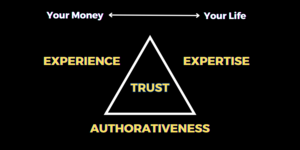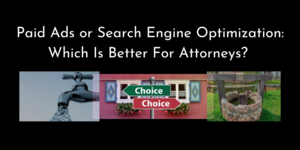These are excerpts from our July 20th, 2020 newletter. It is mailed on Monday mornings and contains insights on business, digital marketing, and technology news.
Be sure to subscribe below so that you get these news and notes first!
On Dissatisfaction....
I thought of this in a recent conversation about current events. There have been numerous examples that highlight the very real differences that many of us experience from others. Invariably, this reality of Dissatisfaction not being enough can be frustrating to everyone.
For those unaware, change is usually uncomfortable. Whether it is the event of awareness or discomfort as changes are put in place, reality shifts.
This is comparable to a recent heart attack sufferer who faces the sobering reality that their medical history or diet/exercise habits are health risks. Most “know” about health risks related to family history, obesity, or lack of exercise. It is something altogether different to experience it!
For those in dissatisfying circumstances, individual events create an emotional response. Where there has been historic (or on-going) disparate treatment, the situations (appearing isolated to others) become galvanizing.
Much like the example of health, the real challenge is maintenance and improvement over time. Dissatisfaction with circumstance can motivate to temporary diets or exercise patterns, focusing on the change (instead of the objective) does not lead to the long-term result.
In our cultural case, we will be better served by:
- Listening for more common awareness
- Acknowledging where things are and are not different than they were
- Working toward healthier environments that we agree to create
Similar to the health metaphor, these changes focus on the outcome; not the motivating event. It is not about the heart attack or the diet/exercise regime but enjoying an active life with those for whom you care.
Google My Business (and why it's important to your practice!)
Two trends are converging that make setting up and optimizing your Google My Business account important.
- Google’s recent SERP updates
- Continued expansion of voice-based searches
If you do not have your Google My Business account setup (and you serve a local customer base), check out these instructions for claiming your listing.
Search Engine Results Pages (SERPs)
When users search Google for “[business] near me” (or similar), in addition to promoted (aka “paid”) results at the top, they get a Google Map with around three nearby results based on location. The location-based rankings function in a similar fashion to organic search results and how they are set up influences your relative positioning.
Here are a couple of suggestions:
- Be sure your business name, address, phone number, website, etc are correct!
- Since some estimates suggest that around 50% of users doing location-based searches will visit, upload consistent photos of your location’s exterior. (Since you can load more than one, show your business from different vantage points at different times of day!)
- Include photos of the inside of your facility, employees performing day-to-day activities, and products/services that you have delivered.
- Determine in advance how you intend to monitor business reviews and how you will respond to them. (Remember that most people accept mistakes or problems, but perceived indifference is a killer.)
There are a few actions that many companies have done in the past that either no longer work or can merit real punishment in SERPs as their algorithms have changed. To understand how these changes are affecting results, we have to acknowledge the fundamental goal of search engines: Find the best results that answer the question that a user asked.
Techniques or “tricks” intended to artificially influence results are a consistent source of frustration for many businesses exactly because they are focusing more on influencing results than they are answering user intent.
To that end, here are a few things that have been done in the past that you need to avoid (or fix immediately):
- Inconsistent Information – If your name, address, phone number, etc is inconsistent across different sites and sources (Yelp, etc), you will look like different businesses. Focus on ensuring that your business identity is correct and consistent.
- Artificial business locations – Unless you are a MailboxesPlus franchise, your business is unlikely to be located at one! Reviews from customers across your areas of service are much stronger evidence of your reach than fake locations that pretend to serve them.
- Links and reviews are valuable social proof. Search algorithms continually improve identifying fake ones or those from sources that have no contextual relationship to your business. Your focus and effort building authentic ones will far outperform your dollars spent buying fake ones!
Voice-based Searches
While the voice-based searches are growing, their influence should not be underestimated. In the same way that location-based results have impacted businesses, voice is a next-generation disruptor.
Prior to widespread location-based results, search engines returned thousands (and often millions) of options.
While the number of possible results were often astronomical, the reality was that most users never interacted with results below the first 8-10. Some estimates suggest that well over half of users pick one of the first 3-5.
SEO (and subsequently Local SEO) represents the attempt to get on that most important first page of results (and within that first couple of results).
Voice will only heighten that competition.
Unlike a SERP (or even a Local group of results on Google Maps), results for a voice-based search are usually one response! It is no longer about being at the top of the group; to be successful, you will have to be the top!
The key to success in this new arena will be understanding the subtleties of voice searches compared to textual searches. Instead of emphasis on keywords/keyphrases, contextual keyword groupings organized and optimized in a language-based format will be a wide-open frontier for businesses.
If you are offering products or services in your local community, optimizing your website and other digital resources around relevant content, links and reputation is going to pay dividends over the long-term.
Other links that caught my attention...
Google’s John Mueller: “Search is not a Science!”
Following up from a link in last week’s edition, if you create good content that answers questions users are asking, you are going to do well!
I have followed Ryan Deiss for quite a while, but his “Drunk Redneck Technology Adoption” theory is pretty spot on (especially for our current trajectory in 2020)!
Introducing the “drunk redneck theory” of technology adoption…
— Ryan Deiss (@ryandeiss) July 20, 2020
If a drunk redneck can screw with it and easily break it (looking at you driverless cars and GPT-3), the technology is at least 10 years away from large-scale consumer adoption.



